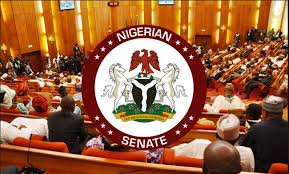Legislature
Senate asks CBN Governor to appear for more insight on Naira free fall against the Dollar

The Senate on Wednesday came to a resolution to summon the Governor of Central Bank of Nigeria, Mr. Godwin Emefiele, for more explanationt on the rapid depreciation of the value of the naira in a closed session
The exchange rate in the autonomous segment (BDCS) of the foreign exchange market is N670 to 1 United States Dollar and it is projected to end at N1000 by end of the year based on the current rate of depreciation.
The senate therefore mandated the Senate Committee on Banking, Insurance and Other Financial Institutions to assess the impact of CBN intervention funds meant to support critical sectors of the economy.
The resolutions were reached by lawmakers after the upper chamber considered a motion sponsored by Senator Olubunmi Adetunmbi (APC – Ekiti North).
The motion was entitled, “State of CBN Intervention Funds and Free Fall Of Naira.”
Coming under Order 41 and 51 of the Senate Standing Order, as amended, Adetunmbi bemoaned Nigeria’s economic reality amid an urgent call for “extraordinary measures”.
He noted that the CBN through its numerous multi-sectoral intervention funds, provided special funds to support critical sectors of the economy.
He explained that in view of such interventions, it had become necessary to assess the state of implementation and effectiveness of the funds deployed for the purpose.
The lawmaker, recalled that the CBN in 2021, placed an indefinite halt on forex bidding by Bureau de Change operators (BDCS) and importers over allegations of abuse and mismanagement.
He observed that the halt by the CBN resulted in a spike of the exchange rate.
According to Adetunmbi, “the two instruments of Personal Travel Allowance (PTA) and Business Travel Allowance (BTA) could only serve less than 20% of the total forex demand by travelers and businesses.”
He expressed worry that the import and export window meant to serve the forex needs of business giants, “has become a rare opportunity that only a privileged few can access.”
“These and a number of others have contributed to the excessive scarcity of forex in Nigeria today”, he added.
He noted that as at the 26th of July 2022 (yesterday), the exchange rate in the autonomous segment (BDCS) of the foreign exchange market is N670 to 1 United States Dollar and projected to end at N1000 by end of the year based on the current rate of depreciation.
He, therefore, advised the Central Bank to take new measures to curb forex scarcity and address the sliding rate of Naira exchange.
In his contribution, Senator Sani Musa (APC – Niger East), faulted the Central Bank’s decision to halt foreign exchange biddings, thereby cutting off the parallel market – Bureau de change operators.
According to him, the attempt by the CBN to control the value of the naira with the continuous exclusion of BDCs would only lead to its further depreciation.
He, therefore, advised the apex bank to rather ensure the regulation and monitoring of the parallel market.
“What CBN used to do was to give out $10,000 (USD) to each of these BDCs with a clear directive for it not to be sold above N470 as against the $419 exchange rate. It worked.
“But today, nobody is determining where the rate is going and I can assure you we can’t have that solution because we are only importing”, he said.
On his part, Senator representing Katsina North District, Senator Ahmad Babba-Kaita, said one way to improve the value of the naira was to encourage foreign investments to attract inflow of other currencies into Nigeria.
“The only way we can access the dollar will be determined by other economies and not ours”, he noted.
He, however, attributed the lack of foreign investments into Nigeria on the poor security situation caused by banditry, terrorism and other criminal activities.
The Senate, in its resolutions, called on the CBN to urgently intervene to stop the rapid decline in the value of the Naira vis-à-vis the Dollar and other international currencies.
It also mandated the Senate Committee on Banking, Insurance and Other Financial Institutions to conduct an assessment of CBN intervention funds and the declining value of Naira to come up with sustainable solutions.
The Senate, at the end of Wednesday’s proceedings, adjourned plenary till September 20th, 2022, for its annual recess.
Legislature
Senate prescribes death sentence for hard drugs manufacturers

**15years for consumers of hard drugs
The Senate on Thursday passed a bill which upgraded the maximum sentence of life imprisonment to the death penalty amidst controversy over the voice votes.
The legislation titled the National Drug Law Enforcement Agency Act (Amendment Bill) 2024 had passed a third reading at the Senate on Thursday.
The Bill sought to review penalties provision, update the list of dangerous drugs, strengthen the operations of the NDLEA, and empower the NDLEA to establish laboratories.
Section 11 of the current act which prescribes that any person who, without lawful authority; Imports, manufactures, produces, processes, plants or grows the drugs popularly known as cocaine, LSD, heroin or any other similar drugs shall be guilty of an offence and liable on conviction to be sentenced to imprisonment for life was amended to reflect a stiffer death penalty.
The bill was passed after the Senate considered the Report of the Committee on Judiciary, Human Rights and Legal Matters presented by Mongonu Tahir, the Senator representing Borno North.
Though the report did not recommend death penalty, Ali Ndume, the Senate Chief Whip, however, moved that the death penalty be replaced with a life sentence.
During a clause-by-clause consideration of Bill, Barau Jibrin, the Deputy Senate President who presided over the session, put the amendment on the death penalty to a voice vote and declared that the “ayes” had it, but Adams Oshiomhole, Senator Representing Edo North objected that the “nays” had it rather.
He argued that matters of life and death should not be treated hurriedly, but Barau said it was too late, as he failed to raise a point of division soon enough.
The bill was subsequently passed.
Speaking to newsmen on the implication of the bill, chairman Senate committee on Human Rights and Legal Matters indicated that the import of the ammendment of the NDLEA act as passed by the Senate prescribed the punishment of death sentence for people who engage in the manufacturing, processing of hard drugs.
“But for the people that engage in the consuption of these hard drugs the sentence prescribed is 15years.
“I think the Senate in its wisdom decided to prescribe death sentence in view of the havoc being created by substance and drug abuse in this country which if not nipped in the bud have the potential of destroying the future of this country because it is the majority of the youth that are engaged in the drug and substance abuse, sometimes innocently as a result of peer group influence. he sentence is 15years without the option of fine.
Legislature
Senate passes for second reading Bill to document, protect domestic workers, employers

The senate on Wednesday passed for second reading a Bill meant to document, protect domestic workers and their employers
This came after the general principles of the bill was presented by the sponsor Sen.Hussaini Babangida (PDP Jigawa) at plenary.
Titled, the bill for an act to provide for the documentation and protection of domestic workers and employees and for other matters there with Babangida in his presentation said the bill was read the first time on Nov 21, 2023.
“The intendment of the bill actually is to raise the issue of the employment, regulation and the management of domestic workers on one hand and on the other hand to deal with the matter of rights of also employers from domestic workers.
“So it is a two way bill that seeks to address the regulation and the operation in the informal sector of the economy.
“Let me just go back to history. In 1998 it was widely reported about a senior flight officer Hadiza Oboh of the Nigerian Airways at the age of 39 who was almost approaching the position of a captain, she was highly celebral. She was murdered by her employees and domestic workers as reported, till date the culprits have not been apprehended because record has it that they are workers from Togo/Benin Republic that she employed who killed her.
“There are a lot of cases of atrocities committed by our domestic workers.
On the part of the employers, there are reports of cases of employers maltreatment including harassment and sometimes killing of workers in their employ.
“Therefore the intendment of the bill is to bring the two sides together so that we can have a harmonized and regulated documented and properly articulated approach to Domestic employee/employer relationship. “It is also know that most of the people we employ we hardly ever know them
“You hire a gate man, you don’t know his history, you don’t know his genealogy, you don’t know his background and no any record of him so If there is any issue you will not be able to trace him. Cases of kidnapping, burglary, house theft rubbery are the result of internal collusion between the domestic staff and outsiders
According to him, over the years, there has been an increase in the incidents of assaults and abuse of domestic workers by their employers or hosts.
According to him, the abuses ranged from slave labour, physical abuse and sexual abuse among others.
He said some times ,the stories are gory, traumatic and mind-boggling, especially against the background that the domestic workers exist in the informal sector.
“They are unionists and they do not have a collective platform to speak for themselves and therefore remain ostensibly vulnerable and helpless.
“On the other side of the coin, is the rise in the state of complicity of crimes committed by domestic workers mostly in connivance with other criminal elements of society against their employers or host.
“These bother on burglary, kidnapping, stealing of children, and sometimes outright murder.”
He said due to urbanization, fast growing cities with chaotic traffic in Nigeria such as Port Harcourt, Lagos, Abuja, Kano and other cities have put significant pressure on working class parents of different categories of the society.
This, he said was compelling many of them to spend more time at work places and far less time at home.
“The concomitant effect of this is that many families, from the low, middle, to the high- income class families have come to the inevitable reality of the necessity of employing and relying on domestic workers to attend to their needs at home.
“It is saddening to note that a very vulnerable group of this category of domestic workers have been consistently played upon by their employers or hosts.
“These are mostly house maids, boys, wards and extended family members.
“A lot of these workers are unregistered and not supported by most national labour laws, They work for private households usually without clear terms of employment, particularly in our country.”
He said Nigeria was yet to have a codified legislation that provides for the right of domestic workers.
He said it was therefore imperative and critical for the 10th Senate to urgently assist the law enforcement agencies with potent legislative interventions by passing the bill.
“Mr. President, distinguished colleagues, in view of the enormous benefits of this bill which has been elaborately deliberated in this lead debate.
“All of you know one house girl, mechanic, one driver, somebody somewhere who needs our help in this chamber.
“I want to urge you to support the second reading of this bill, he said.
The bill, which received support of lawmakers was referred to Committee on Labour and Productivity for further legislative inputs by President of Senate, Godswill Akpabio after it scaled second reading.
The bill is to be brought back to plenary in four week
Legislature
Bill to amend 59 Year-Old ICAN Act scales second reading

A bill meant to amend the 59 Year-old Institute of Chattered Accountants of Nigeria (ICAN) Act CAP 15, 1965 on Tuesday scaled the second reading at the senate.
When passed, the act will empower the Institute to set standards and regulate the practice of Accountancy in Nigeria.
The proposed legislation, among others, is seeking to increase fines payable by a member upon a conviction on indictment from N1,000 to N500, 000.00 (N.5m)
The Chairman, Senate Committee on Appropriation, Senator Solomon Adeola, who sponsored the bill, decried the lack of review of the Act that has been hampering the activities of accountants over the years.
He explained that the current ICAN Act, came into effect on September 1, 1965, some 59 years ago.
The lawmaker explained that in line with the dynamics of the environment, the downturn in the economy and changing needs of chartered accountants over the years, it has become expedient and instructive to amend certain provisions of this Act.
He also reiterated the need to insert new provisions to bring the Act up to current realities and ensure that ICAN remains adaptive, forward-thinking, and attuned to the needs of our nation.
Adeola said, “A total of 26 amendments/ insertions are contained in the proposed amendment of the Act affecting sections and subsections of the Act as well as the Schedules of the Act as set forth below with rationale to guide this debate and allow its passage for second reading.
“There is a need to situate accounting practice to encompass developments since 1965 and to bring the practice to what obtains in other jurisdictions, hence the need to amend Section 1,14, 19 and inserting a new section 15.
“All the sections deal with issues of accounting practice and all areas that a chartered accountant is entitled to practice under the Act.
“Corporate governance of modern professional accountancy organisations has evolved, hence the need to amend parts of Sections 2, 3 and 6 and inserting new Sections 24 to 26.
“For instance, Section 3 of the Act is proposed for amendment because the Council of ICAN started off with a twenty-member structure in 1965 when membership was just 250.
“The number was increased to twenty-five subsequently in accordance with the provisions of the Act. With membership strength of over 53,000 today, the need to increase the membership of the Council to 36 has become compelling.
“Additionally, the amendment aims to strengthen ICAN’s collaboration with other professional bodies and regulatory authorities, both at home and abroad.”
Adeola added that such collaborations would foster synergy, knowledge exchange, and harmonization of standards, guaranteeing that Nigerian chartered accountants remain at par with global best practices and their global counterparts.
He argued that there was a need to enhance the capacity of the institute to carry out its mandate in the area of regulation and compliance.
The Senator said, “This has necessitated the need to amend sections 7, 8,11,12, 16, 18, 20 and 21.
“A glaring example for amendment is Section 18(5). In the 59 years old Act, a proven infraction on summary conviction of any of the offenses attracts a paltry N100 fine while a conviction on indictment attracts only a fine of N1,000.
An observation of a copy of the bill indicated that the the senator proposed that the N1,000 be increased to N500,000.00.
Adeola said, “You will agree with me that these sanctions for offenses that could lead to loss of millions or billions of naira, is not a deterrent to malpractices.”
“These amendments collectively aim to strengthen the legislative framework, expand the Institute’s structure, and enhance regulatory powers and professional integrity within the accountancy profession as in other jurisdictions of the world and global best practice.”
Senators who contributed to the debate agreed that the amendments to the 59 Year-old ICAN Act would improve the operations of the accountants in the country.
-

 Crime6 months ago
Crime6 months agoPolice nabs Killer of Varsity Lecturer in Niger
-

 News3 months ago
News3 months agoFCT-IRS tells socialite Aisha Achimugu not to forget to file her annual returns
-

 Appointment8 months ago
Appointment8 months agoTinubu names El-Rufai, Tope Fasua, others in New appointments
-

 News From Kogi6 months ago
News From Kogi6 months agoINEC cancells election in 67 polling units in Ogori-Magongo in Kogi
-

 News7 months ago
News7 months agoIPOB: Simon Ekpa gives reason for seperatists clamour for Biafra
-

 News From Kogi8 months ago
News From Kogi8 months agoEchocho Challenges Tribunal Judgment ordering rerun in 94 polling units
-

 Metro2 months ago
Metro2 months ago‘Listing Simon Ekpa among wanted persons by Nigeria military is rascality, intimidation’
-

 News4 months ago
News4 months agoKingmakers of Igu/ Koton-Karfe dare Bello, urge him to reverse deposition of Ohimege-Igu

